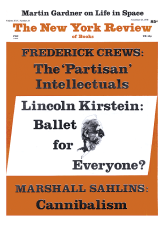In response to:
Lost Generation from the September 28, 1978 issue
To the Editors:
I would like to point out a certain crucial theme in Ned O’Gorman’s The Children Are Dying, which Robert Coles failed to elaborate in his review of that book (NYR, September 28), and which seems to me to be essential to O’Gorman’s work in Harlem.
The entire book hinges on the matter of educating the oppressed. If we define political oppression as the denial of political rights to certain classes of people, then the young citizens of Harlem are doubly oppressed: firstly as children, secondly, as black children. O’Gorman, above all, wishes to extend the sphere of rights to the child. These rights range from the satisfaction of basic biological needs to the civil and political. But what turns out to be a critical point for O’Gorman—and one which becomes his most radical statement—is the establishment of the child’s rights within the family. This means that the child should not have to be subjected to the abuse of a family; that the child’s rights to education and a satisfactory life take priority over natural or biological ties.
Jakób Liszka
New York City
Robert Coles replies:
Who is to decide when a child is being systematically “subjected to the abuse of a family”? Ned O’Gorman struggles mightily with that question, and I tried to indicate why. On the one hand he understandably wants badly hurt children to be sprung from the wretchedness (psychological, social, economic) they have learned to take for granted. On the other hand he doesn’t quite know precisely who is going to stand legally in loco parentis—and with what measure of operational permission or constraint.
It is possible, in the name of a conveniently abstract “radical statement,” to overlook the serious problems which may well appear when any group, however well intentioned its declared ideological purpose, obtains sweeping political powers to intervene in the family life of a nation’s citizens. To move from theory toward the concrete, for years in the Rio Grande Valley of Texas, I’ve seen Anglo social workers go after certain Chicano families—do so as agents of county officials who have discovered that such a stratagem is a damn good way to intimidate activist Chicano migrants. Oh yes, “we” say—in “our” New York and Boston circles—but that is benighted political authority, and in a “progressive” society, intervention would be pursued for entirely different purposes. Certainly some boys and girls, victims of one or another form of child abuse, need outside intervention, as do their beleaguered, often psychotic parents, themselves in most instances once subjected to the very violence or indifference they later as adults transmit. But a phrase such as “the rights of children” can be used as mere rhetoric, or as an umbrella for a program of reasonable social legislation, or alas, as a political statement which all too easily turns into yet another of this century’s excuses for statist arrogance.
This Issue
November 23, 1978



